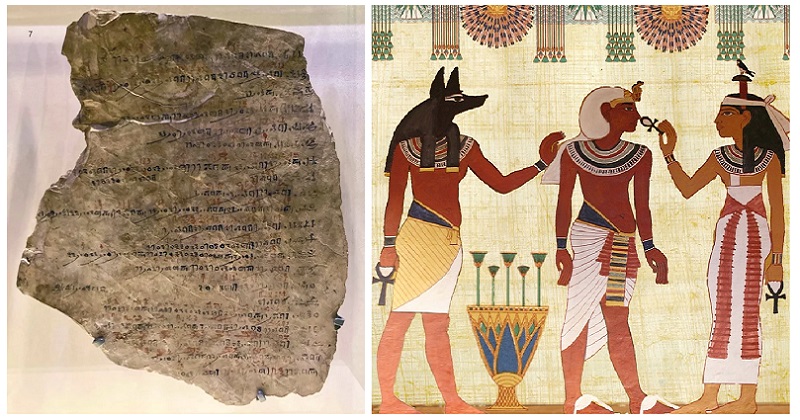Who called these ‘Ancient Egyptian absence excuses’ and not ‘pyramid schemes’?

It shows a 3,200-year-old ostracon – a piece of pottery, usually something from a broken vessel, used like we might use the back of an envelope or spare sheet of paper (Thanks, Google). On this one is written a list of reasons given for work absence.
The actual piece is part of the British Museum collection – but perhaps the less said about that the better – and this is the description from the website.
‘Ostracon with register of attendance at work. Labelled ‘Year 40′ of Ramses II, it provides a workmen’s register for 280 days of the year.
There are twenty-four lines of New Egyptian hieratic on the front and twenty-one lines on the back. A list of forty names is arranged in columns on the right edge of each side, followed to the left by dates written in black in a horizontal line.
Above most dates is a word or phrase in red, indicating the reason why this individual was absent from work on that date.’
Here are some of the more interesting reasons –
DRINKING WITH KHONSU
HIS DAUGHTER WAS BLEEDING
LIBATING TO HIS FATHER
BREWING BEER
BUILDING HIS HOUSE
FETCHING STONE FOR THE SCRIBE
WITH KHONS MAKING REMEDIES
MAKING REMEDIES FOR THE SCRIBE’S WIFE
SUFFERING WITH HIS EYE
EMBALMING HORMOSE
STRENGTHENING THE DOOR
EMBALMING HIS BROTHER
HIS WIFE WAS BLEEDING
THE SCORPION BIT HIM
HIS FEAST
OFFFERING TO THE GOD
Quite a few simply say ‘ill’ or ‘absent’ and we’d like to have been a scarab on the wall when the boss pressed them to come up with a really good reason, like *checks notes* ‘strengthening the door’ or having a period day with his wife or daughter.
Perhaps fetching stone for the scribe wasn’t the belter of an excuse someone thought it was.
Related Post
A shocking documentary proves that mermaids do exist
SHOCKING Revelation: Thuya, Mother of Queen Tiye, Was the Grandmother of Akhenaten and Tutankhamun—What Ancient Egyptian Secrets Did She Leave Behind?
Breaking News: Astonishing Discoveries at Karahan Tepe Confirm an Extraterrestrial Civilization is Hiding on Earth, and NO ONE Knows!
Breaking News: Researchers FINALLY Discover U.S. Navy Flight 19 After 75 Years Lost in the Bermuda Triangle!
NASA’s Secret Investigation: Uncovering the Astonishing Mystery of the UFO Crash on the Mountain!
Explosive UFO Docs LEAKED: Startling Proof That Aliens Ruled Ancient Egypt!
